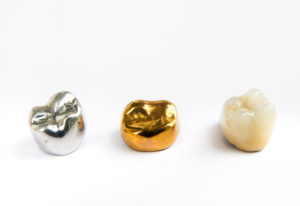Here’s Why You Shouldn’t Wait To Get a Dental Crown in Somerville!
August 5, 2018
 In life, there are some things you can put off and other things you can’t. Holding off on washing the car? No major consequences there. But procrastinating on an oil change for your car? That’s another story! It’s well known that letting small problems go in your car can lead to major breakdowns down the road. Your teeth are actually very similar – when patients don’t follow through on recommended treatment, it can lead to the need for more extensive treatment later on. In this blog, you’ll learn why you might need a dental crown in Somerville – and why holding off on treatment can have major consequences!
In life, there are some things you can put off and other things you can’t. Holding off on washing the car? No major consequences there. But procrastinating on an oil change for your car? That’s another story! It’s well known that letting small problems go in your car can lead to major breakdowns down the road. Your teeth are actually very similar – when patients don’t follow through on recommended treatment, it can lead to the need for more extensive treatment later on. In this blog, you’ll learn why you might need a dental crown in Somerville – and why holding off on treatment can have major consequences!
What Happens if You Have a Cavity and Wait To Get a Crown?
Every cavity starts on the outer layer of a tooth, called enamel. In many cases, people don’t feel any pain from these smaller cavities, but if they’re caught early enough they can usually be treated with a filling.
However, if left untreated, cavities will get larger and destroy more tooth structure. Once a cavity becomes too large, there isn’t enough tooth structure to support a filling, so a crown is recommended to restore a tooth’s size, shape and strength.
But if a patient delays in getting a crown in a reasonable amount of time, eventually the decay will reach the inner layer of a tooth where the pulp and nerve reside. Then a root canal is necessary to remove the infected nerve.
The good news is that when a crown is done at the right stage, it can prevent this from happening. Also, cavities aren’t the only problems that crowns can treat…
What Other Problems Do Dental Crowns Fix?
In addition to large cavities, a dentist in Somerville will recommend dental crowns in the following situations:
- For cosmetic reasons – Sometimes teeth have severe staining or discoloration that can’t be corrected with whitening. Crowns can be done to give these teeth a whole new appearance.
- To fix broken or cracked teeth – Teeth have to withstand incredibly strong chewing forces each day, which can cause them to develop cracks or even begin to chip. Crowns “hug” a tooth together and prevent it from breaking further.
- To restore teeth with old, large fillings – All dental work needs to be replaced eventually. When old fillings are too large, they can’t be replaced with another filling because there isn’t enough existing tooth structure remaining.
- To complete a dental implant – Dental implants are titanium posts that are placed in the jaw to replace the roots of missing teeth. Once they’ve fully healed, a crown is attached to complete the restoration.
- After a root canal is done – Root canals remove the infected pulp and nerve canal, but also the blood supply of a tooth. This leaves the tooth brittle and prone to breaking, so a crown is recommended to restore the tooth’s strength.
Dental crowns are a fantastic way to restore teeth that have been damaged by decay or other issues. And if they’re done early enough, they can save you from needing more dental work later on!
About the Author
Dr. DawnMarie DiGrazia has been working in the dental field since 1993 and has been a dentist since 2002. With many years of experience, she knows that patients who get recommended procedures avoid needing major dental work more than those who don’t, so she always encourages patients to be proactive with their treatment. If you have any questions, she can be contacted via her website or at (908) 722-2999.
No Comments »
No comments yet.
RSS feed for comments on this post.
